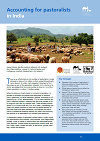Accounting for pastoralists in India
Kamal Kishore and Ilse Köhler-Rollefson / League for Pastoral Peoples and Endogenous Livestock Development / 2020 Estimates of the number of pastoralists in India vary widely, but they probably total around 13 million people. Official data on livestock do not reflect the management system used. Both farmers and pastoralists rely on common-pool resources to maintain their animals. Around 77% of the country’s livestock are kept in extensive systems. Such systems produce an estimated 53% of India’s milk and 74% of its meat. The animals’ manure is a vital source of fertilizer for crop farmers; for many pastoralists manure is their main source of income. A wide range of pastoralist systems exist, from fully mobile to transhumant and sedentary. Species maintained in mobile systems include camels, cattle, ducks, donkeys, goats, pigs, sheep and yaks. Many pastoralists are members of traditional castes, but other groups, known as “non-traditional pastoralists”, are also taking up mobile herding.

